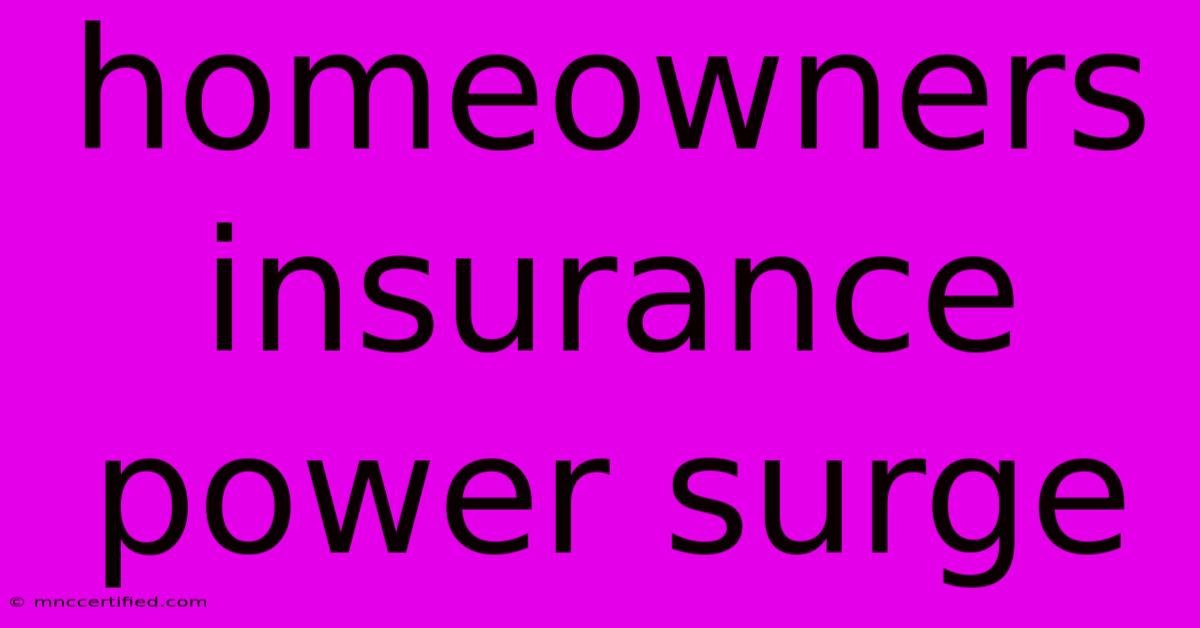Homeowners Insurance Power Surge

Table of Contents
Homeowners Insurance and Power Surges: What's Covered?
Power surges are sudden, unexpected increases in electrical voltage that can wreak havoc on your home's electronics and appliances. While frustrating and costly, understanding your homeowners insurance policy's coverage for power surge damage is crucial. This article will delve into the intricacies of power surge protection, what's typically covered, and how to best protect yourself.
What is a Power Surge?
A power surge occurs when the electrical voltage in your home's wiring system spikes significantly above its normal level. This can be caused by various factors, including:
- Lightning strikes: A common and powerful cause of surges, lightning can send a massive jolt of electricity through your electrical system.
- Power grid fluctuations: Problems within the power grid, such as faulty equipment or unexpected surges from other sources, can impact your home.
- Nearby construction: Construction activities can sometimes cause temporary power surges.
- Internal problems: Faulty wiring within your home or overloaded circuits can also generate surges.
Does Homeowners Insurance Cover Power Surge Damage?
The answer isn't a simple yes or no. While many homeowners insurance policies do offer some coverage for power surge damage, the extent of that coverage varies significantly depending on the policy and the cause of the surge. Most policies cover damage caused by a sudden and accidental event, like a lightning strike. However, damage resulting from gradual wear and tear or pre-existing conditions is usually excluded.
Here's what you need to understand:
- Covered Damages: Typically, homeowners insurance will cover the repair or replacement of damaged appliances and electronics directly caused by a covered power surge. This could include things like refrigerators, washing machines, computers, televisions, and other sensitive equipment.
- Uncovered Damages: Damage caused by a power surge that results from a lack of proper maintenance or pre-existing issues isn't usually covered. For example, if a surge damages an already faulty appliance, the claim may be denied or partially covered.
What to look for in your policy:
Carefully review your policy documents. Look for specific clauses related to:
- Named perils: Policies listing specific covered events (like lightning strikes) offer more clarity.
- "Electrical damage" or "power surge" clauses: These sections detail what is and isn't covered.
- Deductibles: Remember, your deductible will apply to any covered claims.
Protecting Yourself from Power Surge Damage
While insurance can offer some financial protection, proactively safeguarding your electronics is crucial. Consider these preventative measures:
- Surge protectors: Invest in high-quality surge protectors for your valuable electronics and appliances. These devices absorb excess voltage and protect your equipment from damage.
- Whole-house surge protector: Consider installing a whole-house surge protector. This device protects your entire electrical system from surges entering your home.
- Regular maintenance: Regularly inspect your home's electrical system and appliances for signs of wear and tear. Addressing issues promptly can prevent further damage from power surges.
Filing a Claim for Power Surge Damage
If a power surge damages your property, follow these steps:
- Document the damage: Take photos and videos of the damaged items, noting the date and time of the event.
- Report the damage promptly: Contact your insurance company as soon as possible to report the incident and begin the claims process.
- Provide necessary documentation: Be prepared to provide proof of purchase for the damaged items and any other relevant information requested by your insurer.
Key Takeaways: Power Surge and Home Insurance
Power surge damage can be costly. Understanding your homeowners insurance policy's coverage is essential. While many policies offer some protection, proactive measures like using surge protectors significantly reduce your risk. Remember to thoroughly review your policy and document any damage to ensure a smooth claims process. By combining preventative steps with adequate insurance, you can minimize the financial impact of a power surge.
Keywords: homeowners insurance, power surge, surge protection, electrical damage, appliance damage, insurance claim, lightning strike, whole-house surge protector, surge protector, home insurance coverage, homeowners insurance policy.

Thank you for visiting our website wich cover about Homeowners Insurance Power Surge. We hope the information provided has been useful to you. Feel free to contact us if you have any questions or need further assistance. See you next time and dont miss to bookmark.
Featured Posts
-
Car Insurance In Hammond Indiana
Nov 22, 2024
-
Pierss Reaction To Ellens Departure
Nov 22, 2024
-
Truck Broker Liability Insurance
Nov 22, 2024
-
Bengals Player Guarantees Steelers Win
Nov 22, 2024
-
Rooney And Coleens Tv Ratings Clash
Nov 22, 2024